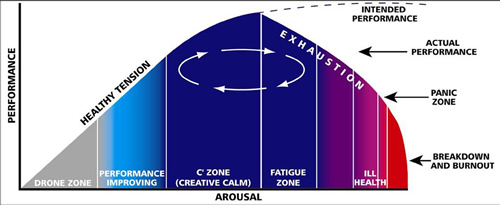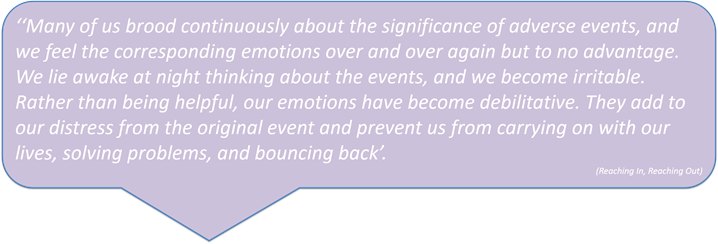Trainee information
Being able to thrive despite experiencing challenging events or situations can appear to be easier for some of us than others. Some appear to manage to carry on, others feel more overwhelmed. Appearances can be deceptive, and how we feel may differ from how we act or how we are careful to appear to others. Just as our biological responses to stress and pressure vary, our psychological responses and vulnerabilities differ too.
Being resilient is to experience challenges or adversity and absorb these into your own experience. But it is also about the ability to use this experience to reach forward to new challenges.
For some it has negative connotations – but it is NOT simply hardiness, denial, ‘getting on with it’ or the absence of burnout.
Resilience is about not just surviving, but learning to thrive again.
Recognising pressure
Resilience is required to get us through the short term and long term pressures we experience. Our personal stores of resilience are affected by our patterns of thinking, our feelings of control, and our strategies to manage pressure. This includes the support we perceive to be available and seek out.
Biologically, acute pressure leads to specific reactions from the nervous and endocrine systems (flight or fight response). The hypothalamus responds, cortisol is sharply increased to allow us to survive the stress. A degree of stress is known to enhance our psychological performance.
 The Human Function Curve (Dr Peter Nixon) from workingforwellbeing.co.uk
The Human Function Curve (Dr Peter Nixon) from workingforwellbeing.co.uk
But chronic stress and pressure leads to longer term high levels of cortisol. This is known to have effects on blood pressure, immune system, and by the effects on the hippocampus memory, emotion and depression. Higher levels of perceived stress can reduce our mental flexibility and functioning. Our vulnerability to this process depends on individual biologic differences. The process can be reversed, and improved with exercise and relaxation techniques. The strongest influence on our response however is the way we think.
Behaviours which protect from chronic stress responses are varied, and the research is diverse on which factors may be most important. Resilient behaviours may include:
Thought processes and emotional intelligence

How we interpret the events we experience influences what we feel and what we do. When we go through adversity or challenges, we infer certain consequences from the experience based on our beliefs. Some of these inferences, while normal reactions, can be unhelpful or even incorrect. Our emotional intelligence can improve resilience by challenging unhelpful or incorrect beliefs and thought processes.
Examples of these thought processes might include overgeneralising, filtering everything as negative, magnification of events, projecting incorrect emotions on to others, perfectionist or ‘invincible’ viewpoints. Using emotional intelligence can recognise our own feelings and beliefs, and those of others, and can be used to manage our emotions. It requires self-awareness, self-motivation, and empathy.
Growth mindset skills

Looking at our thoughts and beliefs can identify areas for change which we otherwise believe to be fixed, into growth mindsets. A growth mindset is a choice, but is a conscious reflection on where our thoughts may be leading to unhelpful emotions.
Perfectionism – we cannot be perfect in everything all of the time. Accept when ok is good enough. Perfectionist thoughts mean that you can often feel that you are failing, when this is not in fact the case. Satisfactory is sometimes good enough.
Perspective – look at a bigger picture. If something has upset you, consider why? Has it been worth the energy of getting upset? Does it require deeper reflection, or is it actually something that can simply be let go?
Acceptance – some challenges to your resilience cannot be changed. Reflecting on the situation can sometimes help to clarify those situations where practical action could be helpful, and those which simply become part of your wider experience.
Fear of failure – can become paralysing as a thought process, as we will then continue to avoid the situations which provoke these feelings. Try to maintain a sense of realistic optimism to keep a fear of failure from impacting on you.
These two TED talks can give further insights into the psychology behind growth mindsets.
The power of believing you can improve
There are many resources on the web for exploring your own resilience and patterns of thinking. Robertson Cooper i-resilience provide a free, quick and easy online assessment to measure your own resilience. There are many others, including resilience wheels with and without scores. For more resources click here.
This page was last updated on: 06.04.2022 at 11.15